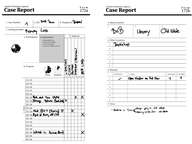
Although it doesn't look quite that bad, my last playtest revealed some further flaws in the design. Of course that is in general a good thing (that is why we do playtests) but at the same time it is also a bit discouraging. And I expected it.
More importantly however was when and why I did the playtest. When you do a playtest you need to have a goal in mind. What are you testing and why. And my idea was specifically to test if the rules made a cohesive package. I'm using a lot of bits and pieces from different systems and mechanics and they needed to blend together. The systems work for themselves and they work in their respective games, but how do they behave in mine?
And for that I needed time.
I didn't start my playtest until around mid-january after I had finished my latest draft in November. I wanted to get that draft out at that time because I wanted that time to pass. But why?
There's an advice from some writers to write your first draft, then put it away and come back to it at a later time. The reason behind that is simple: You become too attached to your writing so it is best to get some distance from it. Have you ever read texts from your youth. I stumbled upon an old folder where I kept some old essays from my school days (they are a while back to say the least). They are always funny to read. What kind of language I used back then and how I told my stories.
And the same concept I wanted to apply to my playtest. How do the rules read, do they make sense? Can they evoke the feeling and flow that I wanted? Not even 2 months might not look like much, but it turned out to be enough for me.
A small town with a big problem
Before continuing I try to give a short recollection on what happened in my playtest (pardon my handwriting).
My agent, Trevor Stone, arrived in a small town late at night. He stayed at some Bed and Breakfast and talked to the old lady owning the B&B about some gossip from the town. She pointed me to the library to check out the librarian. He seems to be ordering his books in a strange manner. Very suspicious.
So the next day, Trevor went to the library. After some conversation it turned out, that actually the old lady was crazy - or at least that's what the librarian said. Apparently she bought some strange book from the bookshop.
Trevor thus visited that bookshop. And indeed the lady bought off some old book about myths about time in ancient times. The book was apparently auctioned from the estate of a recently deceased man. The auction happened in the old manor of the man, just outside of town. The shopkeep also mentioned some old clock.
And so Trevor had to travel some more and went to the old estate / manor. It was (of course) closed so he had to find another way in. After being startled by some loud noises the clock made, he found an open window. Unfortunately for Trevor it was on the first floor. After some failed attempts he then managed to finally enter the house - but probably alerting the town's people, that there's somebody snooping around the old estate. Trevor then found signs that the clock had been moved recently.
And that is where I stopped the playtest after roughly 3 hours.
The good, ...
All in all, the game seems to work. All rules work in tandem to create a flow of story. I don't know yet, if the amount of progress I did in that time is good or bad. I'm still very early in the story, not much has happened yet. But I was keeping notes and read the rules (more on that later) while playing. So maybe once you're more familiar it will go a bit quicker. But I expect that a case will take you several hours.
What has to be noted though, is that I made improvements from my previous playtest. Having a system how to handle a hazard came in very handy (and the situation was very similar). I had to Create Advantage over and over again to get into the house. Trevor found an old ladder, that he had to fix first and then he could climb up to the window with it. It made narrative sense and provided some opportunities to fail (and thus to fail forward).
And when I take anything from my playtest is, that at least I improved something. That is key. When you do playtest you should use that knowledge. Seems logical, but, again, sometimes you are too attached to your game. You have to be willing to kill your darlings.
... the bad, ...
But with all the good, came some bad. And that is where my house of cards began to crumble.
First was the issue of difficulty. The highest rating you can have in any skill from character creation is 2. More often then not however you will probably only have 1 or less dice in your dice pool. To some extent it is because you can't use that skill that has a high rating or you have some banes you got from previous failed tests. Failing isn't bad, it means you can develop conflict and story with it (fail forward). But it feels like the agent is incompetent in everything they do.
It could also be argued, that maybe the skills weren't to distinct enough. I had often a hard time to find an appropriate skill for the situation and argued around, just so that I could use my highest one. But even that didn't help much.
I think one of the reasons was, that a mechanic didn't come into play much: Aid. Since there was only one character, there was nobody that could help them. I could have pushed my character as well to gain more dice, but they cost (a condition) wasn't a good payoff. Especially when considering that Treatment is also worsen with not having multiple characters. In hinsight I should've maybe played with two agents - since in the shows they also always had a partner.
... and the ugly
Where it did fall apart was the investigation.
Yes, it did work in principal, I had a hard time with it. This is where my waiting paid off. I didn't understand the rules anymore. I had to read the rules multiple times over and I think I still don't know, what I actually thought in the first place. They were a late addition and adapted from another source. I thought I made the rules clearer, but apparently I was wrong.
Furthermore it doesn't push forward the story in a manner that I liked. It felt more like going from one person to another in an elaborate fetch quest. Maybe it is because the prompts from the Action / Descriptor tables weren't good enough or I have a bad imagination. Or both.
Conclusion
The key thing to take away is as I said in the beginning: Time. It proved crucial that I stept away from the game for some time.
Especially when it comes to written rules, you have to step back. For you the game might be clear as you have it in your head. You think about it every day. But different rules can become tangled with each other and it only matters what was written down (at least for other people, as devices to detect thoughts haven't been invited yet). So our only tool is time.
